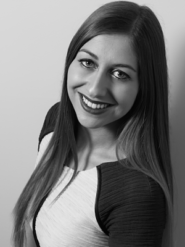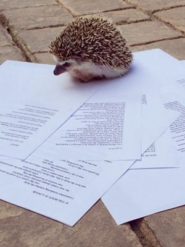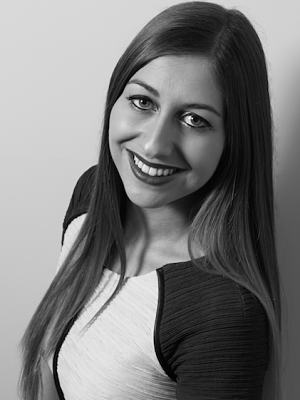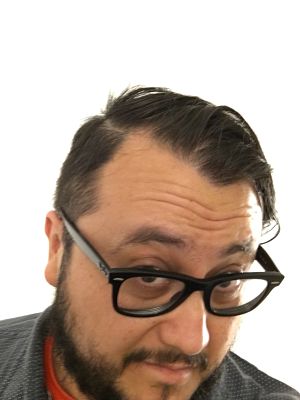Litdish: Ruth Madievsky, Poet
 Originally from Moldova, Ruth Madievsky is the author of a poetry collection titled Emergency Brake (Tavern Books, 2016). Her poetry and fiction appear in Tin House, The American Poetry Review, Kenyon Review, The Iowa Review, The Rumpus, ZYZZYVA, and elsewhere. She is currently at work on a second poetry collection and book of linked short stories. When she is not writing, she works as a pharmacist in Boston.
Originally from Moldova, Ruth Madievsky is the author of a poetry collection titled Emergency Brake (Tavern Books, 2016). Her poetry and fiction appear in Tin House, The American Poetry Review, Kenyon Review, The Iowa Review, The Rumpus, ZYZZYVA, and elsewhere. She is currently at work on a second poetry collection and book of linked short stories. When she is not writing, she works as a pharmacist in Boston.
10 Questions for Ruth Madievsky:
1. Where are you writing us from?
I’m writing you from sunny Los Angeles, though by the time you read this, I might be freezing my ass off in Boston! I was born in Moldova (part of the former Soviet Union) and emigrated to America in 1993. Other than a brief stint in Cincinnati, I’ve lived in LA for most of my life. But for the next few years, I’ll be living in Boston, where my partner will be attending grad school. Leaving the place I’ve lived for most of my life is scary, but I’m excited to see what it’s like to live in a new city. And I hear that Boston has an amazing literary scene! If you or any of your pals/enemies have Boston recommendations, let a girl know.
2. What’s the most recent thing you’ve written?
The most recent thing I’ve written is actually my first article for a science journal! It’s a review article summarizing the latest evidence for diabetes drugs that can also have cardiovascular or kidney benefits and will be out soon in The Permanente Journal. But in terms of poetry, which is probably what you’d rather hear about, I wrote a little ode to a beloved foot clinic in Echo Park. It’s got this rotating sign that people call “Happy Foot Sad Foot.” One side is this beaming foot holding 2 thumbs up, and the other side is this sad, fucked-up-looking foot on crutches with bloodshot eyes. LA lore says that whichever sign is flashing as you drive by is an omen for how your day will go. You can read about it here: https://www.atlasobscura.com/places/the-happy-foot-sad-foot-sign.
3. What’s your writing practice like?
The only writing method that works for me is ass-in-chair, so I pretty much have to hold myself hostage in order to get anything done. I’m never struck by inspiration per se, in the sense of being out in the world and realizing I need to write a poem about something. For me, writing is more of a ritual. I don’t write what I think—I write to figure out what I think. Reading a lot helps! Like many (most?) writers, I prefer reading to writing. Reading all kinds of voices in all kinds of genres and forms helps me see all that writing can be and can do.
4. How does your day job inform your writing?
Ha, my work as a clinical pharmacist definitely informs my writing, but not in a way I can parse out easily. I work very closely with people who are ill (both acutely and chronically) and that kind of work requires a lot of care, attention, and empathy. And also a lot of neuroticism because drugs are dangerous! It’s very easy to hurt or under-treat someone if you’re not extremely meticulous. Those dynamics definitely make their way into my writing and revision process. I tend to revise as a I write, agonizing over every word, rather than getting it all down in a shitty first draft. In my day job, the stakes are very high and fucking up is not an option. Which is probably why I get restless and unsettled when I write something that I know is bad and have to figure out how to make it better. And of course, you’ll definitely see lots of pills and bodies in my work!
5. What are you currently reading? What should we be reading? And why?
 Currently, I’m reading Chelsea Hodson’s essay collection Tonight I’m Someone Else, which I’m loving—it feels like a dreamier version of Maggie Nelson. In my to-be-read pile, I’ve got Cheston Knapp’s essay collection Up Up Down Down, Denis Johnson’s last short story collection The Largesse of the Sea Maiden, Evie Shockley’s poetry collection Semiautomatic, and Tarfia Faizullah’s new poetry collection Registers of Illuminated Villages
Currently, I’m reading Chelsea Hodson’s essay collection Tonight I’m Someone Else, which I’m loving—it feels like a dreamier version of Maggie Nelson. In my to-be-read pile, I’ve got Cheston Knapp’s essay collection Up Up Down Down, Denis Johnson’s last short story collection The Largesse of the Sea Maiden, Evie Shockley’s poetry collection Semiautomatic, and Tarfia Faizullah’s new poetry collection Registers of Illuminated Villages
In terms of recently read-and-loved: Douglas Manuel’s poetry collection Testify is all kinds of gutting and brilliant. Diana Arterian’s poetry collection Playing Monster: Sieche was originally two manuscripts (one about a mother dealing with a stalker and another about growing up with an abusive father) that ended up being sewn into one incredible book. I had the pleasure of reading an advanced copy of Lisa Locascio’s novel Open Me, which is an erotic coming-of-age story in rural Denmark. And Ottessa Moshfegh’s dark, hilarious, and always fucked-up short story collection, Homesick for Another World is one of the best I’ve ever read.
6. What’s your favorite album?
I’m terrible with choosing just one favorite of anything (which is why buffets fill me with child-like wonder), but the most recent album that completely took me is St. Vincent’s Masseduction. I had never listened to her before, and when I heard this album, I fell hard for her. The songs are so sexy, sorrowful, and unapologetically weird (which, to be honest, is the blurb I’ve always wanted for my own work). My favorite songs off that album are “Hang On Me,” “Pills” (obviously, lol), “Happy Birthday, Johnny,” and “New York.” I recommend that anyone who doesn’t know Masseduction listens to it, has a cathartic cry on a dance floor, and makes out with someone under a full moon.
7. What are some of your non-literary interests/ pastimes?
I’ve recently been indoctrinated into the cult of skincare? My mom has a skincare line called LUMINOUS that I’ve been helping her get off the ground. In the process, I’ve spent a lot of time on the Skincare Addiction reddit, and suddenly I have a lot of opinions about vitamin c serums and snail mucin.
8. What’s a piece of advice you’d like to pass on to young/ emerging writers? Or a useful piece of advice you’ve received.
Read more than you write! Read so, so much. It’s the best way to become a good writer, IMO. Also, imposter syndrome is real and will fuck you up in all kinds of ways, so just know that going in. Being part of a writing community (and focusing on what you can contribute to that community rather than what you can get out of it) helps.
9. Why do you write?
I started writing seriously in my early 20s, after many years of reading work that moved me deeply. I wanted to make people feel the way that certain life-altering poems made me feel. I still remember the summer that I realized that poetry could make meaning out of something that was only ever traumatic and shitty. That quite literally changed my life. Of course, there are many other incredible things that writing can do, but with where I was in my life at the time, that particular transformative quality drew me in the most.
10. What question do you wish we would’ve asked you and what’s the answer?
“What is the strangest pet you’ve ever had?” A hedgehog named Boo Radley, who helped edit my poetry collection! Rest in peace, sweet one.






